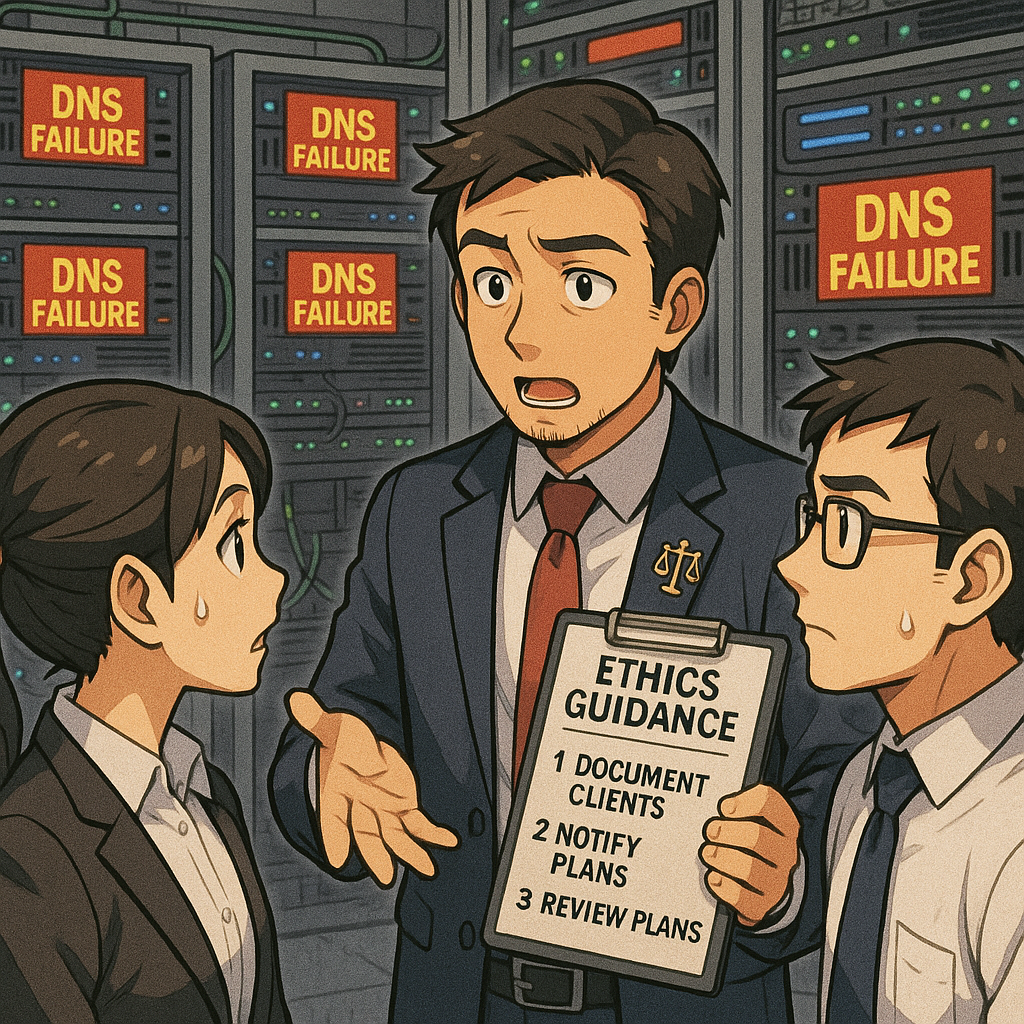MTC: 🔒 Your AI Conversations Aren't as Private as You Think: What the OpenAI Court Ruling Means for Legal Professionals
/A watershed moment in digital privacy has arrived, and it carries profound implications for lawyers and their clients.
The recent court ruling in In re: OpenAI, Inc., Copyright Infringement Litigation has exposed a critical vulnerability in the relationship between artificial intelligence tools and user privacy rights. On May 13, 2025, U.S. Magistrate Judge Ona T. Wang issued an order requiring OpenAI to "preserve and segregate all output log data that would otherwise be deleted on a going forward basis". This unprecedented directive affected more than 400 million ChatGPT users worldwide and fundamentally challenged assumptions about data privacy in the AI era.[1][2][3][4]
While the court modified its order on October 9, 2025, terminating the blanket preservation requirement as of September 26, 2025, the damage to user trust and the precedent for future litigation remain significant. More importantly, the ruling illuminates a stark reality for legal professionals: the "delete" button offers an illusion of control rather than genuine data protection.
The Court Order That Changed Everything ⚖️
The preservation order emerged from a copyright infringement lawsuit filed by The New York Times against OpenAI in December 2023. The Times alleged that OpenAI unlawfully used millions of its articles to train ChatGPT without permission or compensation. During discovery, concerns arose that OpenAI had been deleting user conversations that could potentially demonstrate copyright violations.
Judge Wang's response was sweeping. The court ordered OpenAI to retain all ChatGPT output logs, including conversations users believed they had permanently deleted, temporary chats designed to auto-delete after sessions, and API-generated outputs regardless of user privacy settings. The order applied retroactively, meaning conversations deleted months or even years earlier remained archived in OpenAI's systems.
OpenAI immediately appealed, arguing the order was overly broad and compromised user privacy. The company contended it faced conflicting obligations between the court's preservation mandate and "numerous privacy laws and regulations throughout the country and the world". Despite these objections, Judge Wang denied OpenAI's motion, prioritizing the preservation of potential evidence over privacy concerns.
The October 9, 2025 stipulation and order brought partial relief. OpenAI's ongoing obligation to preserve all new output log data terminated as of September 26, 2025. However, all data preserved before that cutoff remains accessible to plaintiffs (except for users in the European Economic Area, Switzerland, and the United Kingdom). Additionally, OpenAI must continue preserving output logs from specific domains identified by the New York Times and may be required to add additional domains as the litigation progresses.
Privacy Rights in the Age of AI: An Eroding Foundation 🛡️
This case demonstrates that privacy policies are not self-enforcing legal protections. Users who relied on OpenAI's representations about data deletion discovered those promises could be overridden by court order without their knowledge or consent. The "temporary chat" feature, marketed as providing ephemeral conversations, proved anything but temporary when litigation intervened.
The implications extend far beyond this single case. The ruling establishes that AI-generated content constitutes discoverable evidence subject to preservation orders. Courts now view user conversations with AI not as private exchanges but as potential legal records that can be compelled into evidence.
For legal professionals, this reality is particularly troubling. Lawyers regularly handle sensitive client information that must remain confidential under both ethical obligations and the attorney-client privilege. The court order revealed that even explicitly deleted conversations may be retained indefinitely when litigation demands it.
The Attorney-Client Privilege Crisis 👥
Attorney-client privilege protects confidential communications between lawyers and clients made for the purpose of obtaining or providing legal advice. This protection is fundamental to the legal system. However, the privilege can be waived through voluntary disclosure to third parties outside the attorney-client relationship.
When lawyers input confidential client information into public AI platforms like ChatGPT, they potentially create a third-party disclosure that destroys privilege. Many generative AI systems learn from user inputs, incorporating that information into their training data. This means privileged communications could theoretically appear in responses to other users' queries.
The OpenAI preservation order compounds these concerns. It demonstrates that AI providers cannot guarantee data will be deleted upon request, even when their policies promise such deletion. Lawyers who used ChatGPT's temporary chat feature or deleted sensitive conversations believing those actions provided privacy protection now discover their confidential client communications may be preserved indefinitely as litigation evidence.
The risk is not theoretical. In the now-famous Mata v. Avianca, Inc. case, a lawyer used a free version of ChatGPT to draft a legal brief containing fabricated citations. While the lawyer faced sanctions for submitting false information to the court, legal ethics experts noted the confidentiality implications of the increasingly specific prompts the attorney used, which may have revealed client confidential information.
ABA Model Rules and AI: What Lawyers Must Know 📋
The American Bar Association's Model Rules of Professional Conduct govern lawyer behavior, and while these rules predate generative AI, they apply with full force to its use. On July 29, 2024, the ABA Standing Committee on Ethics and Professional Responsibility issued Formal Opinion 512, providing the first comprehensive guidance on lawyers' use of generative AI.
Model Rule 1.1: Competence requires lawyers to provide competent representation, including maintaining "legal knowledge, skill, thoroughness and preparation reasonably necessary for representation". The rule's commentary [8] specifically states lawyers must understand "the benefits and risks associated with relevant technology". Opinion 512 clarifies that lawyers need not become AI experts, but must have a "reasonable understanding of the capabilities and limitations of the specific GenAI technology" they use. This is not a one-time obligation. Given AI's rapid evolution, lawyers must continuously update their understanding.
Model Rule 1.6: Confidentiality creates perhaps the most significant ethical challenge for AI use. The rule prohibits lawyers from revealing "information relating to the representation of a client" and requires them to "make reasonable efforts to prevent the inadvertent or unauthorized disclosure of, or unauthorized access to, information relating to the representation". Self-learning AI tools that train on user inputs create substantial risk of improper disclosure. Information entered into public AI systems may be stored, processed by third-party vendors, and potentially accessed by company employees or incorporated into model training. Opinion 512 recommends lawyers obtain informed client consent before inputting any information related to representation into AI systems. Lawyers must also thoroughly review the terms of use, privacy policies, and contractual agreements of any AI tool they employ.
Model Rule 1.4: Communication obligates lawyers to keep clients reasonably informed about their representation. When using AI tools, lawyers should disclose this fact to clients, particularly when the AI processes client information or could impact the representation. Clients have a right to understand how their matters are being handled and what technologies may access their confidential information.[25][22][20][21]
Model Rule 3.3: Candor Toward the Tribunal requires lawyers to be truthful in their representations to courts. AI systems frequently produce "hallucinations"—plausible-sounding but entirely fabricated information, including fake case citations. Lawyers remain fully responsible for verifying all AI outputs before submitting them to courts or relying on them for legal advice. The Mata v. Avianca case serves as a cautionary tale of the consequences when lawyers fail to fulfill this obligation.
Model Rules 5.1 and 5.3: Supervisory Responsibilities make lawyers responsible for the conduct of other lawyers and nonlawyer assistants working under their supervision. When staff members use AI tools, supervising lawyers must ensure appropriate policies, training, and oversight exist to prevent ethical violations.
Model Rule 1.5: Fees requires lawyers to charge reasonable fees. Opinion 512 addresses whether lawyers can bill clients for time "saved" through AI efficiency gains. The guidance suggests that when using hourly billing, efficiencies gained through AI should benefit clients. However, lawyers may pass through reasonable direct costs of AI services (such as subscription fees) when properly disclosed and agreed upon in advance.
State-by-State Variations: A Patchwork of Protection 🗺️
While the ABA Model Rules provide a national framework, individual states adopt and interpret ethics rules differently. Legal professionals must understand their specific state's requirements, which can vary significantly.[2
Lawyers must protect client’s PII from AI privacy failures!
Florida has taken a proactive stance. In January 2025, The Florida Bar Board of Governors unanimously approved Advisory Opinion 24-1, which specifically addresses generative AI use. The opinion recommends lawyers obtain "affected client's informed consent prior to utilizing a third-party generative AI program if the utilization would involve the disclosure of any confidential information". Florida's guidance emphasizes that lawyers remain fully responsible for AI outputs and cannot treat AI as a substitute for legal judgment.
Texas issued Opinion 705 from its State Bar Professional Ethics Committee in February 2025. The opinion outlines four key obligations: lawyers must reasonably understand AI technology before using it, exercise extreme caution when inputting confidential information into AI tools that might store or expose client data, verify the accuracy of all AI outputs, and avoid charging clients for time saved by AI efficiency gains. Texas also emphasizes that lawyers should consider informing clients when AI will be used in their matters.
New York has developed one of the most comprehensive frameworks through its State Bar Association Task Force on Artificial Intelligence. The April 2024 report provides a thorough analysis across the full spectrum of ethical considerations, including competence, confidentiality, client communication, billing practices, and access to justice implications. New York's guidance stands out for addressing both immediate practical considerations and longer-term questions about AI's transformation of the legal profession.
Alaska issued Ethics Opinion 2025-1 surveying AI issues with particular focus on competence, confidentiality, and billing. The opinion notes that when using non-closed AI systems (such as general consumer products), lawyers should anonymize prompts to avoid revealing client confidential information. Alaska's guidance explicitly cites to its cloud-computing predecessor opinion, treating AI data storage similarly to law firm files on third-party remote servers.
California, Massachusetts, New Jersey, and Oregon have issued guidance through their state attorneys general on how existing state privacy laws apply to AI. California's advisories emphasize that AI use must comply with the California Consumer Privacy Act (CCPA), requiring transparency, respecting individual data rights, and limiting data processing to what is "reasonably necessary and proportionate". Massachusetts focuses on consumer protection, anti-discrimination, and data security requirements. Oregon highlights that developers using personal data to train AI must clearly disclose this use and obtain explicit consent when dealing with sensitive data.[31]
These state-specific approaches create a complex compliance landscape. A lawyer practicing in multiple jurisdictions must understand and comply with each state's requirements. Moreover, state privacy laws like the CCPA and similar statutes in other states impose additional obligations beyond ethics rules.
Enterprise vs. Consumer AI: Understanding the Distinction 💼
Not all AI tools pose equal privacy risks. The OpenAI preservation order highlighted critical differences between consumer-facing products and enterprise solutions.
Consumer Plans (Free, Plus, Pro, and Team) were fully subject to the preservation order. These accounts store user conversations on OpenAI's servers with limited privacy protections. While users can delete conversations, the court order demonstrated that those deletions are not permanent. OpenAI retains the technical capability to preserve and access this data when required by legal process.
Enterprise Accounts offer substantially stronger privacy protections. ChatGPT Enterprise and Edu plans were excluded from the preservation order's broadest requirements. These accounts typically include contractual protections such as Data Processing Agreements (DPAs), commitments against using customer data for model training, and stronger data segregation. However, even enterprise accounts must preserve data when covered by specific legal orders.
Zero Data Retention Agreements provide the highest level of protection. Users who have negotiated such agreements with OpenAI are excluded from data preservation requirements. These arrangements ensure that user data is not retained beyond the immediate processing necessary to generate responses.
For legal professionals, the lesson is clear: consumer-grade AI tools are inappropriate for handling confidential client information. Lawyers who use AI must ensure they employ enterprise-level solutions with proper contractual protections, or better yet, closed systems where client data never leaves the firm's control.
Practical Steps for Legal Professionals: Protecting Privilege and Privacy 🛠️
Given these risks, what should lawyers do? Abandoning AI entirely is neither realistic nor necessary. Instead, legal professionals must adopt a risk-management approach.
Conduct thorough due diligence before adopting any AI tool. Review terms of service, privacy policies, and data processing agreements in detail. Understand exactly what data the AI collects, how long it's retained, whether it's used for model training, who can access it, and what security measures protect it. If these answers aren't clear from public documentation, contact the vendor directly for written clarification.
Implement written AI policies for your firm or legal department. These policies should specify which AI tools are approved for use, what types of information can (and cannot) be input into AI systems, required safeguards such as data anonymization, client consent requirements, verification procedures for AI outputs, and training requirements for all staff. Document these policies and ensure all lawyers and staff understand and follow them.
Default to data minimization. Before inputting any information into an AI system, ask whether it's necessary. Can you accomplish the task without including client-identifying information? Many AI applications work effectively with anonymized or hypothetical scenarios that don't reveal actual client matters. When in doubt, err on the side of caution.
Obtain informed client consent when using AI for client matters, particularly when inputting any information related to the representation. This consent should be specific about what AI tools will be used, what information may be shared with those tools, what safeguards are in place, and what risks exist despite those safeguards. General consent buried in engagement agreements is likely insufficient.
Use secure, purpose-built legal AI tools rather than consumer applications. Legal-specific AI products are designed with confidentiality requirements in mind and typically offer stronger privacy protections. Even better, consider closed-system AI that operates entirely within your firm's infrastructure without sending data to external servers.
Never assume deletion means erasure. The OpenAI case proves that deleted data may not be truly gone. Treat any information entered into an AI system as potentially permanent, regardless of what the system's privacy settings claim.
Maintain privileged communication protocols. Remember that AI is not your attorney. Communications with AI systems are not protected by attorney-client privilege. Never use AI as a substitute for consulting with qualified colleagues or outside counsel on genuinely privileged matters.
Stay informed about evolving guidance. AI technology and the regulatory landscape are both changing rapidly. Regularly review updates from your state bar association, the ABA, and other professional organizations. Consider attending continuing legal education programs on AI ethics and technology competence.
Final thoughts: The Future of Privacy Rights in an AI World 🔮
The OpenAI preservation order represents a pivotal moment in the collision between AI innovation and privacy rights. It exposes uncomfortable truths about the nature of digital privacy in 2025: privacy policies are subject to override by legal process, deletion features provide psychological comfort rather than technical and legal certainty, and third-party service providers cannot fully protect user data from discovery obligations.
For legal professionals, these realities demand a fundamental reassessment of how AI tools fit into practice. The convenience and efficiency AI provides must be balanced against the sacred duty to protect client confidences and maintain the attorney-client privilege. This is not an abstract concern or distant possibility. It is happening now, in real courtrooms, with real consequences for lawyers and clients.
State bars and regulators are responding, but the guidance remains fragmented and evolving. Federal privacy legislation addressing AI has yet to materialize, leaving a patchwork of state laws with varying requirements. In this environment, legal professionals cannot wait for perfect clarity before taking action.
The responsibility falls on each lawyer to understand the tools they use, the risks those tools create, and the steps necessary to fulfill ethical obligations in this new technological landscape. Ignorance is not a defense. "I didn't know the AI was storing that information" will not excuse a confidentiality breach or privilege waiver.
As AI becomes increasingly embedded in legal practice, the profession must evolve its approach to privacy and confidentiality. The traditional frameworks remain sound—the attorney-client privilege, the duty of confidentiality, the requirement of competence—but their application requires new vigilance. Lawyers must become technology stewards as well as legal advisors, understanding not just what the law says, but how the tools they use might undermine their ability to protect it.
The OpenAI case will not be the last time courts grapple with AI data privacy. As generative AI proliferates and litigation continues, more preservation orders, discovery disputes, and privilege challenges are inevitable. Legal professionals who fail to address these issues proactively may find themselves explaining to clients, judges, or disciplinary authorities why they treated confidential information so carelessly.
Privacy in the AI age demands more than passive reliance on vendor promises. It requires active, informed engagement with the technology we use and honest assessment of the risks we create. For lawyers, whose professional identity rests on the foundation of client trust and confidentiality, nothing less will suffice. The court ruling has made one thing abundantly clear: when it comes to AI and privacy, what you don't know can definitely hurt you—and your clients. ⚠️

































